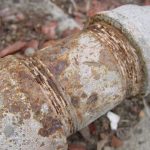When you view and purchase a home, it’s an exciting time, and you will need a certified home inspector to look over various aspects of the property. These professionals are not typically concerned with an in depth examination of the plumbing in your prospective new home. To get a good look at the state of the plumbing and sewer lines, you will need a professional plumber. Let’s look at the importance of a plumbing inspection and five tips that all home buyers should give some serious consideration.
The Importance of a Plumbing Inspection
If a plumbing inspection isn’t carried out, the overlooked problems can manifest later in a variety of different ways. The worst are leaks and flooding; water damage is very difficult and expensive to fix. Water damage is also very effective at destroying precious items and keepsakes that are kept in storage in a basement or attic.
Another critical reason for a plumbing inspection is to evaluate the system before a purchase is made. This is vital for a number of reasons, but having a good understanding of any potential problems will help you to evaluate how much they will cost to repair. These costs should be accounted into your budget and reflected in the asking price. If the plumbing is in good shape, you will have confidence that it’s a good idea to proceed with the purchase.
It’s always advisable to have the prospective home inspected by a certified plumber. But, there are some things that anyone can spot, such as cracked baths or shower stalls, corrosion on fixtures and other more obvious issues. Don’t be shy about asking questions regarding the plumbing history in the home. A seller will expect you to be curious and you need to have a good understanding of the property before you commit to buy.
5 Plumbing Inspection Tips
- Find Out if the Pipes Contain Lead
There have been many reports in recent years about lead in drinking water supplies. Lead is a toxic metal that can easily leach into water and pipes containing lead should be a concern for a home buyer. Older homes may still have lead plumbing or copper plumbing that has been soldered together with a lead based solder. If lead is present in the plumbing the whole home should be repiped and this should be factored into your budget.
- Examine the Water Heater Condition
A water heater is vital to provide hot water for your entire home, and it needs to be in good shape. Size is also important, a family of four should have access to a 40 gallon tank at a bare minimum. A typical water heater should last for around ten years, but they can last for far longer if they are well maintained. If the equipment looks old and worn out, it’s likely that it will fail sooner rather than later. It’s perfectly reasonable to ask the seller to install a new water heater as part of the home purchase agreement. If that is not possible, take a look at the prices for a new unit, including the installation costs and then consider this when making an offer. Don’t forget that there are rebates available if you choose an energy efficient water heater.
Find out where the water heater is located, they are often situated in a garage or closet. It should be easy to get to for adjustments and repairs and a water heater located in a crawl space will be harder to maintain. Examine the area; some water heaters are situated on top of a pan or platform to protect against water leaks. This does offer a certain amount of protection from water damage, but it will only go so far if there is a living space nearby.
- Find Out the Water Meter Location
The water meter is usually found where you will find the shutoff valve for the main line water supply. This unit needs to be in good working condition so that it can be quickly turned off in an emergency. If the prospective home has a well water supply, there should be a shutoff valve located somewhere indoors, and it’s often found under the kitchen sink. Shutting off the shutoff valve should ensure that there is no water supplied to any faucets in any room in the home and this should be checked.
- Find Out How the Waste is Removed
It’s important to know if your prospective home is connected to the municipal sewer system or a septic system. If the home has a septic tank, you will need to know the location and when it was last serviced and emptied. Take a look at the area; there should be no discernible odor and no signs of leakage. If you find any evidence of leaks or unusual odors this could be a sign that there is a leak or septic problem. This should be investigated further by a certified plumber and fixed before you sign any contract.
- Find Out About Previous Water Damage
Find out if the faucets in the bathroom and kitchen are in working condition. Also, check that the showers, tubs and toilets, all work as you would expect them to. As you carry out this inspection take a look at the floor around the base of any cabinets or fixtures. Look out for signs of water damage; older water marks could be a sign of a previous water leak that has been repaired. Even if the leak was fixed quickly, nearby floorboards could have been affected, and they should be checked for signs of rot. Examine the floor around the toilet base; it should feel solid and not warped or soft. Try to gently rock the toilet; there should be no movement, if there is it could indicate that the floor is not solid due to underlying water damage.
Plumbing can be expensive to repair and replace, and this is the last thing that you need after making a large purchase. Contact a
local certified plumber, and you can get a more in-depth inspection of your prospective new home.
By Giovanni Longo President Flood Brothers Plumbing
Giovanni Longo is a 3rd generation master plumber who has been practicing his craft and trade in the greater Los Angeles area for well over a decade and a half. A plumbing and hydraulics-engineering innovator, Giovanni’s particular world-class expertise focuses on dealing with challenging sewer system designs as well as resolving complex commercial and residential draining issues. As a certified Flood Mitigation expert, he is also well versed in a wide variety of water damage and remediation solution.





